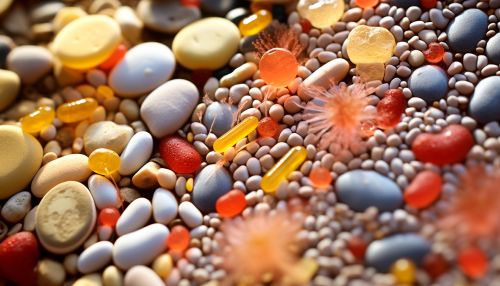Gut Microbiota and Human Health
Introduction
The human gut microbiota is a complex and diverse ecosystem of microorganisms that resides in the digestive tracts of humans. This community of bacteria, viruses, fungi, and other microorganisms plays a critical role in human health, influencing a wide range of physiological processes, from nutrient metabolism to immune function and beyond. The gut microbiota's composition and function can be influenced by various factors, including diet, lifestyle, and genetics, and alterations in the gut microbiota have been linked to a variety of health conditions.


Composition of the Gut Microbiota
The gut microbiota is composed of a diverse array of microorganisms, with bacteria making up the majority. These bacteria belong to several different phyla, including Firmicutes, Bacteroidetes, Proteobacteria, and Actinobacteria, among others. Each individual's gut microbiota is unique, with the specific composition influenced by factors such as age, diet, and health status. Despite this variability, a core set of microbial species is shared among healthy individuals, suggesting a common functional role.
Role in Health and Disease
The gut microbiota plays a crucial role in maintaining human health. It aids in the digestion and absorption of nutrients, synthesizes vitamins and other essential compounds, and plays a key role in the development and regulation of the immune system. Moreover, the gut microbiota serves as a barrier against pathogenic microorganisms, preventing their colonization and proliferation in the gut.
Alterations in the composition and function of the gut microbiota, known as dysbiosis, have been associated with a variety of health conditions, including obesity, diabetes, cardiovascular disease, inflammatory bowel disease, and even neurological disorders such as Parkinson's disease and autism. However, the exact mechanisms by which the gut microbiota influences these conditions are still not fully understood and are the subject of ongoing research.
Factors Influencing the Gut Microbiota
Several factors can influence the composition and function of the gut microbiota. Diet is one of the most significant, with dietary components serving as substrates for microbial metabolism and influencing the growth and activity of different microbial species. Other factors include age, genetics, lifestyle factors such as physical activity and stress, and the use of medications, particularly antibiotics, which can significantly alter the gut microbiota.
Modulation of the Gut Microbiota
Given the gut microbiota's role in health and disease, strategies to modulate its composition and function are of great interest. These include dietary interventions, such as the consumption of probiotics and prebiotics, which can promote the growth of beneficial microbial species and improve gut health. Fecal microbiota transplantation, the transfer of gut microbiota from a healthy donor to a recipient, is another approach that has shown promise in treating certain conditions associated with gut dysbiosis.
Future Directions
Research on the gut microbiota is a rapidly evolving field, with new discoveries continually expanding our understanding of the complex interactions between the gut microbiota and human health. Future research directions include the development of novel therapeutic strategies to modulate the gut microbiota, the identification of microbial biomarkers for disease, and the exploration of the gut-brain axis and its implications for neurological health.
